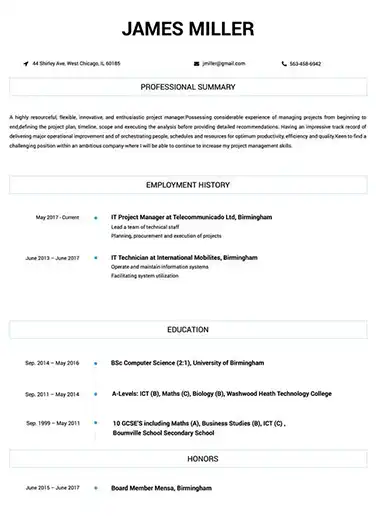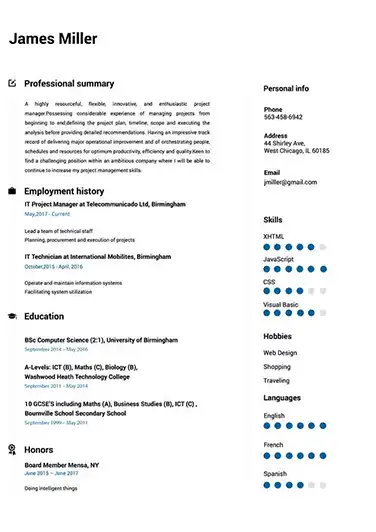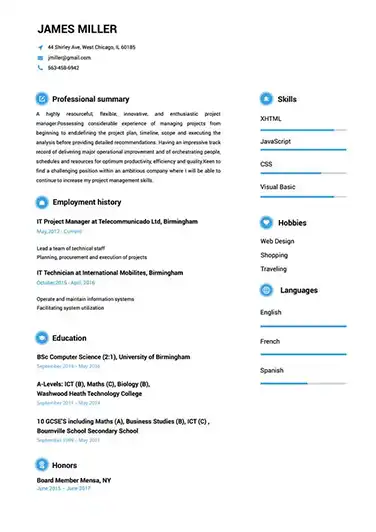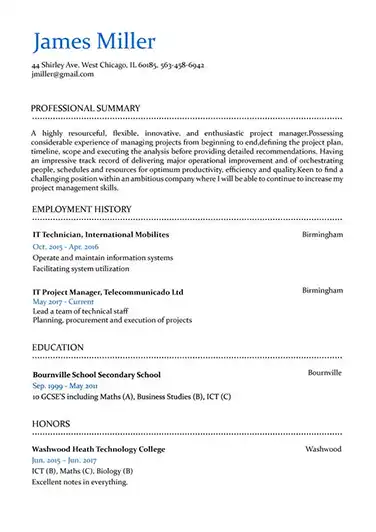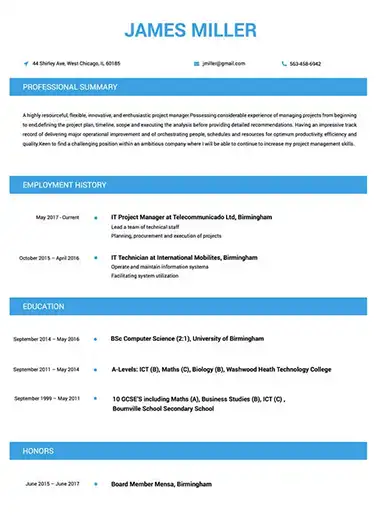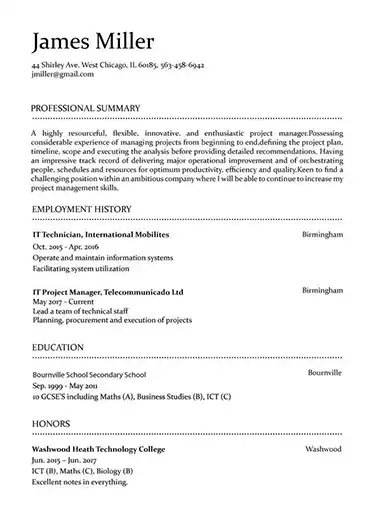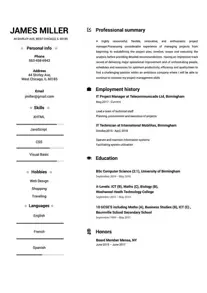 Use This Template
Use This Template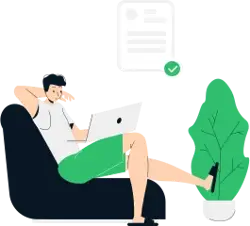
Build your resume in 15 minutes
Create an awesome resume that meets the expectations of potential employers with our selection of professional, field-tested resume templates.
translator: Resume Samples & Writing Guide
ursulamiller58@yahoo.com
857-113-5492
Professional Summary
Employment history
- Assist in the development of localization strategies
- Research and analyze source material to ensure accurate translations
- Participate in language-related training and workshops
- Resolve language-related issues with clients and other stakeholders
- Assist in the development of localization strategies
- Proofread and edit translated documents for accuracy
- Translate written documents from one language to another
- Research and analyze source material to ensure accurate translations
- Prepare language-related reports and presentations
Education
Skills
Do you already have a resume? Use our PDF converter and edit your resume.
jonespauline@zoho.com
916-853-6665
Employment history
- Prepare language-related reports and presentations
- Develop and maintain a glossary of technical terms
- Maintain up-to-date knowledge of relevant terminology and cultural nuances
- Develop and maintain a glossary of technical terms
- Provide language support to other departments
- Maintain up-to-date knowledge of relevant terminology and cultural nuances
- Collaborate with other translators and interpreters to ensure accuracy
- Proofread and edit translated documents for accuracy
- Provide feedback and suggestions to improve translation processes
Education
Skills
kenny-gray@mail.com
712-149-1034
Employment history
- Research and analyze source material to ensure accurate translations
- Maintain up-to-date knowledge of relevant terminology and cultural nuances
- Prepare language-related reports and presentations
- Prepare language-related reports and presentations
- Research and analyze source material to ensure accurate translations
- Develop and maintain a glossary of technical terms
- Provide feedback and suggestions to improve translation processes
- Provide language support to other departments
- Assist in the development of language-related resources
Education
Skills
edwood@icloud.com
948-733-1306
Professional Summary
Employment history
- Monitor and review the accuracy of translations
- Research and analyze source material to ensure accurate translations
- Ensure that all translations meet quality standards
- Provide language support to other departments
- Resolve language-related issues with clients and other stakeholders
- Assist in the development of localization strategies
- Monitor and review the accuracy of translations
- Provide feedback and suggestions to improve translation processes
- Develop and maintain a glossary of technical terms
Education
Skills
long.zane@mail.com
786-217-1071
Employment history
- Proofread and edit translated documents for accuracy
- Assist in the development of language-related resources
- Provide language support to other departments
- Develop and maintain a glossary of technical terms
- Participate in language-related training and workshops
- Proofread and edit translated documents for accuracy
- Resolve language-related issues with clients and other stakeholders
- Ensure that all translations meet quality standards
- Prepare language-related reports and presentations
Education
Skills
Not in love with this template? Browse our full library of resume templates
The job of a translator involves far more than most people realize. After all, it isn’t simply a process of directly translating words from one language to another. As Anthony Burgess, the famed writer of One Flew Over the Cuckoo’s Nest once put it, “Translation is not a matter of words only: it is a matter of making intelligible a whole culture.”
Needless to say, this isn’t news to either translators themselves or recruiters of translators. They both know that there’s a world of difference between a mediocre translation and one that has been completed with a high level of skill.
In the end, the quality of a translation primarily comes down to one person: the translator. That’s why recruiters are only willing to hire the best of the best. If you want to position yourself as a world-class translator in your job hunt, you’ll need to submit a world-class resume for each job.
With the demand for translators soaring, there’s never been a better time to fix up your resume so you can finally snag your dream job. The Bureau of Statistics projects that employment of interpreters and translators will grow 19 percent from 2018 to 2028. This is significantly faster than the average for all occupations – in fact, an astounding 14 percent points higher!
But don’t let this news make you complacent. Even if you’ve built your reputation as a highly-skilled translator, you still need a resume that shows off your most relevant and attractive professional experiences, qualities, and skills to a recruiter. Don’t know how to do this? Check out our translator resume examples and writing guide below. It will shed a light on:
- The essential components of a translator resume
- Insider tips for preparing for an interview (including practice questions)
- How to create a formidable “Skills” section
- How to grab a recruiter’s attention with a resume summary or objective
- The importance of tailoring your resume for each application and how to do so
1. Multiple Template Examples
2. How to Write a Translator Resume That Will Get You the Job?
How do you format a translator resume?
As a translator, you’ll know what a difference good or bad document formatting makes. Being given a poorly formatted document to translate can make your job substantially more challenging and frustrating to carry out.
So why would you subject a recruiter to the same experience? Formatting your resume correctly will not only encourage a recruiter to view your application in a positive light, but also give it the full attention it deserves.
If you’re wondering which format to use in your translator resume, it’s worth keeping in mind that most HR experts recommend using a reverse-chronological format. It’s designed to put a spotlight on your work experiences so a recruiter realizes what a consummate professional you are. In addition to presenting your work experiences prominently in your resume, it also orders them from most to least recent.
Pro tip: If you’re just starting out as a translator, experts recommend opting for a functional format instead. This type of format hones in on your skills so that you can draw a recruiter’s attention away from your inexperience.
There’s another crucial consideration you will need to be mindful of: how to expertly arrange your resume’s layout. Pay careful attention to the following layout guidelines to ensure that your resume matches up with recruiters’ expectations:
- Number of Pages: A single page.
- Fonts to Use: Fonts that are recognizable for their professional nature, such as Georgia and Time New Roman.
- Fonts to Avoid: Any you wouldn’t dare to hand over a translation in, such as Brush Script and ITC Kristen.
- Margins: 1 inch on all sides.
- Line Spacing: 1 or 1.15.
- Header size: 14-16 point size.
- Text size: 11-12 point size.
How do you make a great translator resume that addresses what recruiters are looking for?
A great translator resume should showcase why you – out of the hundreds of thousands of other applicants – should be hired. This is no doubt a lofty goal to achieve, but it is far from impossible.
You will be able to put together a great translator resume once you have an understanding of what a recruiter is looking for, from the skills a candidate should have as a translator, to the formatting and layout expectations they have for resumes (see the section above for more about this).
Generally speaking, recruiters will be after translators who are able to offer the necessary experience, qualifications, and skills to effectively carry out the responsibilities of a given job. However, recruiters won’t all be looking for the same qualities in the candidates they shortlist. After all, the idea of a so-called “perfect candidate” will differ from job to job, and therefore, from recruiter to recruiter.
For example, some jobs only require an entry-level candidate, while others require someone who has been in the industry for a certain amount of years. Some jobs require candidates to be generalists, while others require them to possess a very specific skill set. And needless to say, the focus languages sought for each job will change each time as well!
In short, if you want to make a great translator resume, you’ll need to address what a given recruiter is after from an ideal candidate for a given job. To do this, you’ll need to customize your resume to perfectly match the requirements of each application.
If you’re wondering how to do this, refer to the section, “How to target your resume for each application,” below. The fantastic thing about putting in the effort to customize your resume is that you’ll soon be rewarded with more interview requests than you’ve ever had to handle!
How do you prepare for a job interview as a translator?
If you’re like most people, you’ll be a bundle of nerves before an interview. While you may not be able to get rid of your nerves completely, thoroughly preparing beforehand will at least allow you to get a better handle on them. Here are our top tips for how to effectively prepare for a job interview as a translator:
- Refamiliarize yourself with the role and company: A huge mistake many candidates make is that they focus exclusively on preparing answers to questions about themselves. However, it’s worth remembering that interviewers also place substantial importance on candidates’ answers to questions about the given role.
To ensure you flawlessly answer these types of questions, make sure to study the job ad carefully to pinpoint what the role entails as well as what the interviewer is looking for.
- Research the company: In addition to knowing the role like the back of your hand, you’ll need to familiarize yourself with the company you’re interviewing at. Interviewers are only interested in hiring candidates who can genuinely show that they want to work at their company, so they’re likely to quiz you on your knowledge of it. Even if you’re not asked any specific questions, peppering your answers with relevant tidbits about their company is a surefire way to impress.
When conducting your research of the company, try to memorize a few notable details about the company such as its history, vision and values, plans for the future, etc.
- Complete a few practice translation tasks: When you’re busy preparing your answers to practice questions (of which you’ll find some examples below), it’s easy to forget to brush up on the very skills you’re being interviewed for: translating. Even if you can translate a document with your eyes closed, being asked to do so during your interview is a completely different story. Even the most competent translators can become frozen with anxiety, so preparation is key.
To ensure you perform any translation tasks you’re asked to do just as well as usual, make sure to schedule the time to practice translating at least a few passages before your interview. If the job also involves interpretation, be sure to practice this too!
- Believe in yourself: It sounds trite to say, but it will truly make a difference if you walk into an interview with your head held high. Many candidates end up severely underselling themselves during an interview because they lack confidence in their own abilities. They may even question how they managed to get the interview in the first place.
Remember, a recruiter chose to interview you because they saw that you bring something valuable to the table. So be confident and strive to put your best foot forward. If you truly lack self-confidence, try to fake it ‘til you make it!
Which questions are likely to be asked during the interview process?
If you’re wondering what questions a recruiter, hiring manager, or your future manager are likely to be asked during a translator interview, you’ve come to the right place. Below is a selection of 20 common questions you can use to prepare for your interview:
Practical questions:
- Can you give me an overview of who you are, professionally speaking?
- When can you begin?
- Why do you think we should hire you?
- Do you have any questions about the position?
Questions about you as a professional:
- Can you describe yourself in 3 words?
- What languages can you translate?
- Why did you decide to become a translator?
- What qualities set you apart as a translator?
- Can you understand different dialects and accents?
- What areas do you need to improve on as a translator?
- Do you prefer to work alone or in a team?
- What are your top skills?
Questions about working at the company:
- What is your process of preparing for a translation task?
- What tools do you rely on to complete a typical translation task, if any?
- What would you do if you’re experiencing difficulty translating a certain piece of text?
- Can you share some examples of previous translation problems you’ve faced and how you overcame them?
- Can you share details about a time you encountered a problem with your manager or a coworker and how you resolved it?
Questions about the company:
- When was our company founded?
- What is our company’s mission statement?
- What makes our company unique?
- What other languages do we offer translation services for?
Pro tip: Once you’ve mastered your answers to these questions, search on Google for more. The more questions you’re acquainted with and have solid answers for, the more you’ll boost your chances of acing your interview.
What are ideal translator job qualifications and how do you list them correctly?
Education
While not a requirement for all jobs, it is considered ideal for a translator to hold a bachelor’s degree. Ideally, a translator’s major should be in one of the languages they specialize in translating, although many jobs will simply require a bachelor’s degree in any major.
To list your bachelor’s degree or any other educational qualifications in your resume, add them to your resume’s “Education” section.
In order to get this right, avoid providing a detailed account of your educational experiences, like this candidate did:
EDUCATION
- I completed a Spanish Bachelor of Arts at the University of Texas at Tyler because I wanted to learn a language that would prove to be useful in both my career and my life. Once I discovered that Spanish is the fourth most widely spoken language in the world, I knew Spanish was the right choice for me. After studying diligently every day for 3 years, I finally graduated in 2019.
This is far too much information to feature in your “Education” section. As a consequence of how difficult this is to read, it would be challenging for a recruiter to identify the most fundamental details regarding your educational background.
In order to make these details crystal clear to a recruiter, you should list them out rather than write about them in full sentences. There are 4 main details you should list, unless specified otherwise. These details are:
- The name of your degree
- The institution or college you received it from
- The state the institution or college is located in
- The years you studied your degree
Putting this in practice, the example above should, in actual fact, look like this:
EDUCATION
- Spanish Bachelor of Arts, University of Texas at Tyler, TX, 2016-2019
See how much easier that is to read? Make sure to follow this same format when adding your educational qualifications to your resume.
Pro tip: If you wish to share more details about your educational background with a recruiter, you can do so in your cover letter. Just make sure that any additional details you provide are relevant to the job you’re applying for!
Language Proficiency
Your job as a translator is dependent on your mastery of at least two languages, with one of them usually being English. It’s therefore vital to state your language proficiency levels in your resume.
Ideally, you should be able to quantify your language proficiency by showing that you hold a relevant language certification. Many jobs even require candidates to hold a specific language certification level as evidence that they have the language skills necessary to excel in the job. For example, an English to Japanese translation job may require you to have passed a particular level of the Japanese-Language Proficiency Test (JLPT).
To list any languages you are proficient in, list the following information about each language in your resume’s “Languages” section:
- The name of the language
- The dialect of the language, if any
- The level of your proficiency
- The names of any language proficiency certifications you have
- The level you achieved with your certification
For example:
- English (American): Native proficiency
- Chinese (Mandarin): Full professional proficiency, HSK VI
- Spanish (Latin American): Elementary proficiency, DELE, A2
Pro tip: While it may seem obvious to state that you speak English at a native level, it is important to include this fact in your resume.
Training and Certifications
There are no mandatory training sessions or certifications that translators need to undertake in order to work. That being said, it is considered ideal for translators to have some relevant training and certifications to their name as it is one way of demonstrating your commitment to your profession.
A certification that will most definitely help your resume stand out is an American Translators Association (ATA) certification. As the ATA explains, holding this certification “Reflects a strong commitment to the profession and its ethical practice—a distinction that can attract clients and open doors to new business.”
Training and certifications may even be mandatory or strongly desired for certain jobs. This is particularly the case for jobs in niche areas of translation. For example, if you want to apply for a job translating documents as a court interpreter in California, your resume will need to highlight the fact you are a certified court interpreter.
So how can you include relevant training and certifications in your resume? List the following details in your resume’s “Training and Certifications” section:
- The name of the training or certification
- The name of the institution that provided it
- The state you received it in
- The year you undertook the training or obtained the certification
To show you how this should look like in action, take a look at the following example:
TRAINING AND CERTIFICATIONS
- American Translators Association (ATA) Certification, ATA, California, 2020
Pro tip: It’s important to keep your translator certifications up to date on your resume. You should also be willing to undertake more professional learning even once you’ve been hired.
Which soft and hard skills should you mention? How do you do so correctly?
The “Skills” section is without a doubt one of the most important sections in your entire resume. It provides an overview of your skills so that a recruiter can ascertain if you have the right skill set to perform well in the given job.
This is why it’s critical that you carefully select which skills to showcase. It’s considered best practice to only list around 6 to 8 in this section, so you’ll need to be cut-throat. Fortunately, this isn’t the only opportunity you have to highlight your skills in your resume. You should also feature them in your “Employment History” section and “Resume Objective” or “Resume Summary.”
So how do you go about selecting the most appropriate skills to showcase in your resume? You need to select the skills a recruiter is actively looking for from a candidate. To determine what these skills are, consult the job ad of the job you want to apply for. If you look carefully, you will notice that a variety of skills are mentioned throughout the entire job ad.
These are technically known as “keywords” in the HR industry, as they represent the ‘key’ qualities a recruiter is after. By including keywords in your resume, you’ll be able to tell a recruiter, “I offer the precise qualities you are looking for.”
It is important to keep your eyes peeled for both soft and hard skills. Soft skills are skills that rely on your communication or interpersonal abilities. Hard skills are practical skills that rely on your technical knowledge and abilities.
Below, we’ve provided some examples of soft and hard skills we identified in real-life job ads for translators. Look at them to see what types of skills you can expect to come across in your job search. Remember though, you need to feature the skills you identify in each particular job ad.
Soft skills
- Ability to work well with others
- Familiarity with academic language
- Customer service oriented
- Ability to be flexible
- Detail oriented
- Accurate
- Ability to cope with several tasks simultaneously
- Professional attitude
- Working well under pressure
- Flexible to meet scheduling needs
Hard skills
- Translating from English to target language and vice versa
- Reading and interpreting documents
- Document translation using technical language
- CAT (computer assisted translation) tool expertise (e.g. Plunet, Memsource, and SDL Trados Studio)
- Writing routine reports and correspondence
- Ability to collaborate with other translators and customers on editing of completed document
- Obtaining additional information by contacting key stakeholders
- Proofreading translations and transcriptions
- Transcribing and translate audio recordings in both languages
- Performing effective research of unknown terminology as needed
Pro tip: Be sure to keep a lookout for “cultural awareness competency” keywords in job ads. These work almost as a combination of soft and hard skills because they demonstrate your ability to understand that language is an expression of culture and how to put this into practice. For example, you may need to show that you can “avoid generalizations and stereotyping by recognizing the cultural patterns.” Or that you can use “culturally-appropriate behavior.”
How to write a resume objective or summary and examples of both
If you thought that recruiters are going to pore over your resume, think again. Studies have shown that recruiters only spend an average of 6 seconds reading each candidate’s resume. That’s barely enough time to read more than a few lines of your resume!
Of course, recruiters will take more time to read the resumes of candidates who can show that they have strong potential.
The easiest way to convince a recruiter in only 6 seconds that your resume is worth reading properly is to craft a 2 to 4 sentence long resume objective or resume summary. Entry level candidates should opt for the former while experienced candidates should include the latter. You can learn more about how to write each one below:
Resume objective
A resume objective is basically a concise self introduction that emphasizes why you’re a star entry-level candidate. Given how important it is, you shouldn’t rush writing it like this candidate did:
- Aspiring translator who is really good at French and can speak a few other languages. I offer a range of enviable qualities as a soon-to-be translator which are sure to be valued at Translations United. I can’t wait to put my strong translation skills to the test at your company.
It may not seem too bad to an untrained eye, but this is precisely the type of resume objective recruiters can’t stand. Look more closely and you’ll see that the candidate hasn’t shared any specific skills or attributes they offer. They didn’t even specify what their language proficiency levels are for the languages they speak!
Recruiters want to see specific and relevant details about your skills, attributes, and any other information that frames you as a valuable candidate in your resume objective. These qualities are exemplified by the following candidate’s resume objective:
- Highly organized and motivated multilingual translator who specializes in French to English and English to French translations is excited to apply for the role at Translations United. In addition to holding a DALF C2 certification in French, I am also highly-proficient in Italian and am currently studying beginner Spanish.
The recruiter for Translations United would anticipate reading the rest of this candidate’s resume as they successfully used their resume objective to establish themselves as an entry-level candidate with a number of attractive qualities. They did so by noting their French certification, the level they achieved, and the fact that they can do two-way translations.
They also made sure to mention their proficiency level for Italian or Spanish, despite not holding certifications in either. Another great thing this candidate did was mention their soft skills (highly organized and motivated).
Resume summary
Your resume summary should show how everything you developed and attained in your years of experience as a translator come together to make you the perfect candidate for the job. Before you set off to write one, be sure to avoid the mistakes this candidate made:
- Translator with 6 years of experience is looking for a full-time role at Travelers’
Paradise. In my years of being a translator, I have translated countless documents from English to Spanish. I am highly skilled at it and couple my translation skills with other skills too. I am certain I would be able to make a positive impact at your company and develop my skills further if given the chance to work at your company.
The problem with this resume summary is that the candidate tried to build themselves up to be an amazing translator, but failed to provide any proof they actually are one. For example, they repeatedly mention their skills without elaborating on what they are. Moreover, they focus so much on themselves without explaining how their competencies relate to what Travelers Paradise is looking for from a translator.
- Detail-oriented English-to-Spanish translator with a DELE C1 certification and 6 years of experience working as a translator in the travel industry wishes to bring their customer-oriented approach to translating customers’ queries to Travelers’ Paradise. I am known for my dedication as well as my ability to work under pressure. Skilled in using Plunet and SDL Trados Studio.
A recruiter for Travelers’ Paradise would be eager to discover more about this candidate because they made their most relevant professional experiences, skills, and attributes shine. For example, instead of just stating they are an English-to-Spanish translator, they backed this up by the fact they have a DELE C1 certification. Moreover, they further highlighted their suitability for the role by sharing that they already have substantial experience working in the travel industry.
A recruiter would also appreciate the fact that the candidate addressed some of the skills they outlined in the job ad. For example, the candidate put a spotlight on both their soft skills (detail-oriented, customer-oriented approach, dedication and ability to work under pressure) and hard skills (English-to-Spanish translation, translating customers’ queries, ability to use Plunet and SDL Trados Studio).
How to target your resume for each application
As you’ll be well aware, every translation job is different. That’s why you can tick all of the boxes for one job and then barely meet the requirements for another.
Why, then, are you using the same resume for all of your job applications? Just as you adapt your translations to meet the particular needs of each project, you should also adapt your resume to meet the particular needs of each job.
This is called targeting or customizing your resume for each application. While you could completely rewrite your resume each time, there’s a smarter way to do this. Just modify each section of your resume until it reflects what a recruiter is after.
If you have read the prior section about how to put together your “Skills” section, you’ll already know how to do this. Simply identify which keywords appear in a job ad for the job you want and naturally incorporate them throughout your resume and entire frame your resume around them. This will in turn help you make your resume as relevant as possible to a given job ad and a recruiter’s expectations.
For example, let’s say you have professional experiences and skills in translating from Japanese to English as well as from Chinese to English. If you want to apply for a job that only involves Chinese to English translation, focus your resume predominantly on these skills and experiences. Of course, you can also mention your Japanese to English skills and experiences, but to a much lesser degree (and only if they are relevant to what the recruiter is seeking).
How to make your resume stand out
A good-enough resume isn’t going to snag you the job – you need to ensure your resume shines. Here are 3 expert tips that will help you make your resume stand out:
- Quantify your achievements: A surefire way to make your resume stand out is to ensure each of the responsibilities you list in your “Employment History” section read more like achievements. That means you shouldn’t only be stating what duties you were responsible for in your current and prior jobs. You need to frame them in a way which highlights the value you brought to each given task.
The easiest way to do this is to provide tangible examples of your achievements and/or quantifying them with numbers and percentages. For example, you can make the vague achievement, “Completed a translation task given by a client at the last minute in record time,” sound far more impressive by using numbers to clarify what “record time” means. With this in mind, you could instead write, “Completed a translation task given by a client at the last minute in one-third of the usual time.”
- Don’t underestimate the power of having useful soft skills: Translators sometimes make the mistake of thinking that their second-to-none language and translation abilities will be enough to get them hired. As we explored above, your resume should not only highlight your technical skills, but also your interpersonal ones.
Even if the job ad doesn’t specifically mention any soft skills, you should still include a handful that you possess in order to show that you’re a well-rounded candidate.
- Ensure you address any additional criteria: Some jobs will require candidates to meet additional criteria that have nothing to do with their translating skills or experience. For example, a job ad may state that only candidates who have a driver’s license or a BLS/CPR card will be considered.
If you want to apply for a job that has additional criteria like this, be sure to address the fact that you meet it somewhere on your resume. Remember, you put your application at risk of being rejected if you don’t make this clear. Depending on what the criteria is, you may be able to mention it in your “Skills” section, “Employment History” section, or even in your “Resume Summary” or “Resume Objective.”
3. How to Write a Winning Resume Using Resumebuild.com’s Easy-to-Use Resume Builder
You may assume that you’ll find making your resume an easy task, given your superior languages abilities. While you may indeed fare better than those who don’t have such a way with words, resume-making is hardly ever a walk in the park. After all, there is a seemingly innumerable amount of things you need to account for in order to make a resume that recruiters love.
Given all there is to do, there’s no getting around the fact that it takes hours and hours to make even a half decent resume…or is there? Our streamlined resume builder at Resumebuild.com makes compiling your resume a completely trouble-free process.
It separates each section of your resume into manageable steps so that you can easily put together your resume piece-by-piece. You can even look forward to using any one of our HR-approved resume templates that catches your eye.
If you’re ready to make 2020 the year you get hired for your dream translator job, give our resume builder a go!
translator Job Descriptions; Explained
If you're applying for an translator position, it's important to tailor your resume to the specific job requirements in order to differentiate yourself from other candidates. Including accurate and relevant information that directly aligns with the job description can greatly increase your chances of securing an interview with potential employers.
When crafting your resume, be sure to use action verbs and a clear, concise format to highlight your relevant skills and experience. Remember, the job description is your first opportunity to make an impression on recruiters, so pay close attention to the details and make sure you're presenting yourself in the best possible light.
translator
- Translation of training materials (Agendas, opening remarks, presentations, modules and manuals).
- Translation of training presentation for PFM national advisors within the line Ministries ( MoE, MoPH, MAIL & MoPW);
- Interpretation in Training and Workshop;
- Translation of national advisor annual work plans;
- Translation of Concept Notes for planning and policy directorates in line Ministries;
- Translation of official letters, Agendas, Invitation letters and Budget Calendar
- Develop Meeting and Workshop Minutes;
translator Job Skills
For an translator position, your job skills are a key factor in demonstrating your value to the company and showing recruiters that you're the ight fit for the role. It's important to be specific when highlighting your skills and ensure that they are directly aligned with the job requirements, as this can greatly improve your chances of being hired. By showcasing your relevant skills and experience, you can make a compelling case for why you're the best candidate for the job.
How to include technical skills in your resume:
Technical skills are a set of specialized abilities and knowledge required to perform a particular job
effectively. Some examples of technical skills are data analysis, project management, software proficiency,
and programming languages, to name a few.
Add the technical skills that will get hired in your career
field with our simple-to-use resume builder. Select your desired resume template, once you reach the skills
section of the builder, manually write in the skill or simply click on "Add more skills". This will
automatically generate the best skills for your career field, choose your skill level, and hit "Save &
Next."
- Data Entry
- Language Proficiency
- Translation
- Proofreading
- Interpreting
- Multilingual Communication
- Cultural Awareness
- Grammar
- Editing
- Terminology
- Localization
- Quality Assurance
- Writing
- Voice Recognition
- Microsoft Office
- Computer-Aided Translation
- Subtitling
- Transcription
- Typesetting
- Audio/Video Recording
How to include soft skills in your resume:
Soft skills are non-technical skills that relate to how you work and that can be used in any job. Including
soft skills such as time management, creative thinking, teamwork, and conflict resolution demonstrate your
problem-solving abilities and show that you navigate challenges and changes in the workplace
efficiently.
Add competitive soft skills to make your resume stand-out to recruiters! Simply select
your preferred resume template in the skills section, enter the skills manually or use the "Add more skills"
option. Our resume builder will generate the most relevant soft skills for your career path. Choose your
proficiency level for each skill, and then click "Save & Next" to proceed to the next section.
- Communication
- Interpersonal
- Leadership
- Time Management
- Problem Solving
- Decision Making
- Critical Thinking
- Creativity
- Adaptability
- Teamwork
- Organization
- Planning
- Public Speaking
- Negotiation
- Conflict Resolution
- Research
- Analytical
- Attention to Detail
- Self-Motivation
- Stress Management
- Collaboration
- Coaching
- Mentoring
- Listening
- Networking
- Strategic Thinking
- Negotiation
- Emotional Intelligence
- Adaptability
- Flexibility
- Reliability
- Professionalism
- Computer Literacy
- Technical
- Data Analysis
- Project Management
- Customer Service
- Presentation
- Written Communication
- Social Media
- Troubleshooting
- Quality Assurance
- Collaboration
- Supervisory
- Risk Management
- Database Management
- Training
- Innovation
- Documentation
- Accounting
- Financial Management
- Visualization
- Reporting
- Business Acumen
- Process Improvement
- Documentation
- Relationship Management.
How to Improve Your translator Resume
Navigating resume pitfalls can mean the difference between landing an interview or not. Missing job descriptions or unexplained work history gaps can cause recruiters to hesitate. Let's not even talk about the impact of bad grammar, and forgetting your contact info could leave your potential employer hanging. Aim to be comprehensive, concise, and accurate.
Employment history
- Provide language support to other departments
- Proofread and edit translated documents for accuracy
- Assist in the development of language-related resources
- Ensure that all translations meet quality standards
- Translate written documents from one language to another
- Maintain up-to-date knowledge of relevant terminology and cultural nuances
Education
Skills
Include your Contact Information and Job Descriptions
Missing job descriptions lessens your chances of getting hired.
Key Insights- Employers want to know what you've accomplished, so make sure to include descriptions for all of your previous jobs.
- Keep job descriptions short but don't just list your jobs.
- Never copy-paste a job description to post on your resume. Get inspired and use tools to help you write customized descriptions.
How to Optimize Your translator Resume
Keep an eye out for these resume traps. Neglecting to detail your job roles or explain gaps in your career can lead to unnecessary doubts. Grammar blunders can reflect negatively on you, and without contact information, how can employers reach you? Be meticulous and complete.
cecilmiller@outlook.com
812-614-2172
Employment history
- Translate written documents from one language to anotheR
- Ensure that all translatIons meet quality standards
- Maintain up-to-date knowledgE of relevant terminology and culturAl nuances
- Pruofread and edti translated documents for accurcay
- Prepaire langauge-related reports and presentatiosn
- Moniter and reveiw the accuraccy of translations
- Collabrate with other translators and interpreters to ensue accuracy
- Prepare language-related reports and presenttions
- Monitor and reviw the accuracy of translations
Education
Skills
Correct Grammar and Address Gap Years in Your Resume
Don't leave unexplained gaps in your work history.
Key Insights- When explaining gaps in your employment section, start by being honest.
- Elaborate on the gap and show that you never stopped learning.
- Explain and elaborate any gap in your work history by highlighting new skills.
translator Cover Letter Example
A cover letter can be a valuable addition to your job application when applying for an translator position. Cover letters provide a concise summary of your qualifications, skills, and experience, also it also gives you an opportunity to explain why you're the best fit for the job. Crafting a cover letter that showcases your relevant experience and enthusiasm for the Accounts Payable role can significantly improve your chances of securing an interview.
Miller ursulamiller58@yahoo.com
857-113-5492
801 Sycamore Avenue, Manzanola, CO
81058
Lockheed Martin
Bethesda, Maryland
Lockheed Martin Recruitment Team
I am writing to express my interest in the Lead Translator role at Lockheed Martin. As a Translator with 12 years of experience, I am confident that I possess the necessary skills and qualifications to excel in this position.
As someone who has faced challenges in various areas of my life and has overcome them, I am confident in my ability to adapt and thrive in any environment. I have developed a reputation for being a collaborative team player and an effective problem solver, which has been instrumental in my career's success. With my experience and passion for the field, I am excited to apply my skills to this role and contribute to your organization's growth and success.
I appreciate the opportunity to apply for the Lead Translator position. I am committed to making a positive impact on the world, so I am thrilled about the opportunity to join your team and work towards achieving our shared goals for the betterment of everyone.
With gratitude,
Ursula Miller
857-113-5492
ursulamiller58@yahoo.com
Ursula Miller
Showcase your most significant accomplishments and qualifications with this cover
letter.
Personalize this cover letter in just few minutes with our user-friendly tool!
Related Resumes & Cover Letters
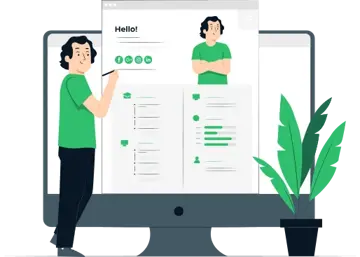
Build your Resume in 15 minutes
Create an awesome resume that meets the expectations of potential employers with our selection of professional, field-tested resume templates.

